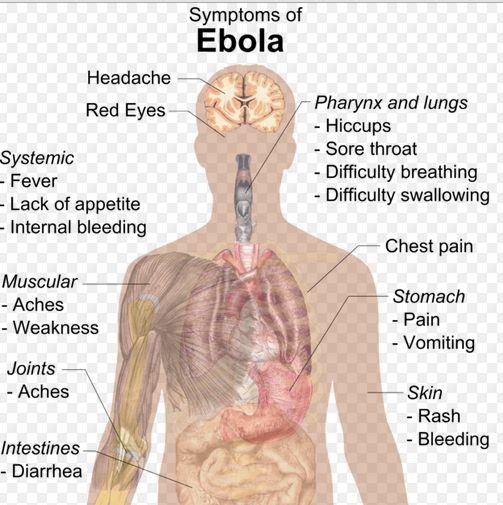Use of Anti-Ebola Drug ZMapp Triggers Charges of Racism
| Arthur Dominic Villasanta | | Aug 10, 2014 04:17 AM EDT |
(Photo : Wikipedia) Ebola symptoms
The use of the untested anti-Ebola virus drug ZMapp on only three persons--all of them Caucasians--is raising the specter of racism in the treatment of the deadly disease.
Its use on two Americans on July 31 was on compassionate grounds. Use of an "investigational drug" such as ZMapp outside of clinical trials is for patients with serious or life-threatening conditions.
Like Us on Facebook
Spanish missionary, Miguel Pajares, who is infected with the deadly Ebola Virus Disease (EVD), on Aug. 7 became only the third person to receive the experimental drug.
Like the only other previous recipients of the drug, the Americans Dr. Kent Brantly and nurse Nancy Writebol, Fr. Pajares saw his condition stabilize.
Spanish doctors treating the priest at the Carlos III Hospital in Madrid, a leading institution in the treatment of tropical and infectious diseases, said Fr. Pajares is in a stable condition and has not experienced any hemorrhaging since receiving ZMapp.
The condition of Dr. Brantly and Writebol, who are being cared for at the Emory University Hospital in Atlanta, Georgia, is said to be improving since they received the treatment on July 31 in Liberia.
Made by the American company Mapp Biopharmaceutical, Inc., ZMapp is an experimental serum mixture of three humanized monoclonal antibodies for immunological protection against the Ebola virus.
ZMapp boosts the immune systems of EVD victims. It has not been approved for clinical trials.
In laboratory tests, ZMapp is claimed to have increased to 80 percent the chances of survival of Ebola infected mice. Two other studies on monkeys saw the monkeys' survival rate improve by 50 percent and 43 percent.
Only 20 percent of humans infected by the Ebola virus survive with normal treatment plans. There is no known cure for the Ebola virus.
It is not yet known if ZMapp creates a viable cure, but Dr.Brantly and Writebol appear to be improving, said their doctors.
Charges of racism were ignited by the fact that none of the close to two thousand West Africans infected with Ebola have received ZMapp.
As of Aug. 6, there were 961 deaths due to Ebola in West Africa, said the World Health Organization (WHO). A further 1,779 persons are infected with the deadly virus.
Also on Aug. 6, three distinguished doctors called for the release of ZMapp for affected African nations.
The call was made by Peter Piot, a co-discoverer of the Ebola virus in 1976 and director of the London School of Hygiene and Tropical Medicine; Prof. David Heymann of the Chatham House Center on Global Health Security and Prof. Jeremy Farrar, director of the Wellcome Trust.
U.S. Pres. Barack Obama, however, replied on the same day that "I think we have to let the science guide us."
Unavailability of experimental treatment in the most affected regions has ignited some controversy, and has raised the specter of racism.
To defuse the controversy, WHO announced a meeting to be held the week of Aug. 10 to explore new drug treatments which are currently under development, including ZMapp.
The antibody work that led to the development of ZMapp resulted from research projects funded by the U.S. Army more than a decade ago.
The U.S. Defense Threat Reduction Agency announced additional investments in Mapp Biopharmaceutical based on the "promising results" of ZMapp. The U.S. federal government is one of the major investors in Mapp Biopharmaceutical.
Reacting to charges that ZMapp was being used selectively, Mapp Biopharmaceutical said the limited supplies of ZMapp currently available are almost gone. The company noted that even if they began full production, it would take months to get ZMapp to doctors in West Africa.
Doctors said the only reason Dr. Brantly and Writebol were given ZMapp was because Samaritan's Purse, the aid organization that employs Dr. Brantly, specifically requested the Ebola treatment plan using ZMapp.
Dr. Salim S. Abdool Karim, director of Caprisa, an AIDS research center in South Africa, told the New York Times that if ZMapp had been used in West Africa then there would have been a political fallout.
"It would have been the front-page screaming headline: 'Africans used as guinea pigs for American drug company's medicine'."
©2015 Chinatopix All rights reserved. Do not reproduce without permission
EDITOR'S PICKS
-

Did the Trump administration just announce plans for a trade war with ‘hostile’ China and Russia?
-

US Senate passes Taiwan travel bill slammed by China
-

As Yan Sihong’s family grieves, here are other Chinese students who went missing abroad. Some have never been found
-

Beijing blasts Western critics who ‘smear China’ with the term sharp power
-

China Envoy Seeks to Defuse Tensions With U.S. as a Trade War Brews
-

Singapore's Deputy PM Provides Bitcoin Vote of Confidence Amid China's Blanket Bans
-

China warns investors over risks in overseas virtual currency trading
-

Chinese government most trustworthy: survey
-

Kashima Antlers On Course For Back-To-Back Titles
MOST POPULAR
LATEST NEWS
Zhou Yongkang: China's Former Security Chief Sentenced to Life in Prison

China's former Chief of the Ministry of Public Security, Zhou Yongkang, has been given a life sentence after he was found guilty of abusing his office, bribery and deliberately ... Full Article
TRENDING STORY

China Pork Prices Expected to Stabilize As The Supplies Recover

Elephone P9000 Smartphone is now on Sale on Amazon India

There's a Big Chance Cliffhangers Won't Still Be Resolved When Grey's Anatomy Season 13 Returns

Supreme Court Ruled on Samsung vs Apple Dispute for Patent Infringement

Microsoft Surface Pro 5 Rumors and Release Date: What is the Latest?










